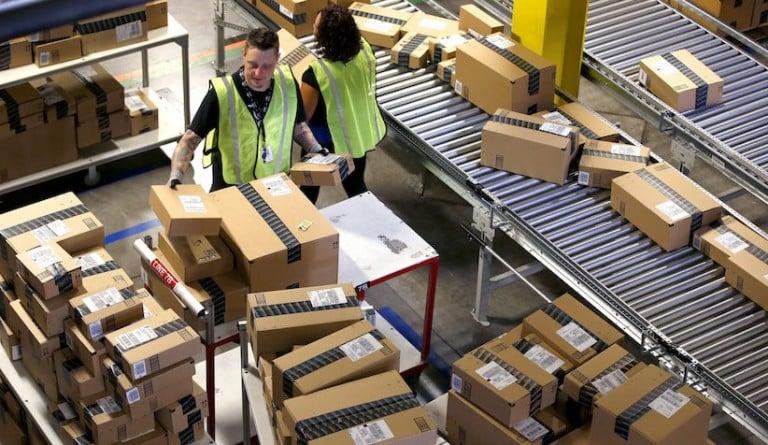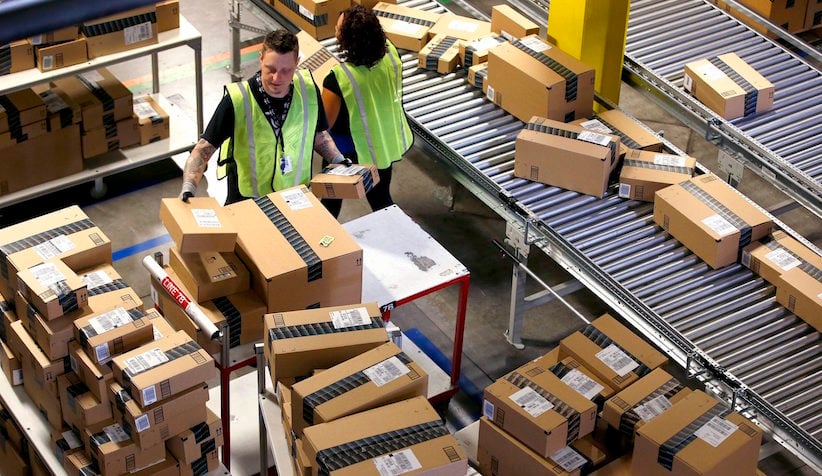It’s time to raise the duty-free limit for online shoppers
Ottawa should let Canadians import more expensive online purchases duty free, and it can do so without putting brick-and-mortar retailers at a disadvantage.

FILE – In this Monday, Dec. 2, 2013, file photo, Amazon.com employees organize outbound packages at an Amazon.com Fulfillment Center on “Cyber Monday” the busiest online shopping day of the holiday season in Phoenix. Amazon announced Wednesday, March 9, 2016, it has finalized an agreement to lease 20 Boeing jets from Air Transport Services Group as it builds out its delivery capabilities. (AP Photo/Ross D. Franklin, File)
Share

Potential changes to the “de minimus threshold,” a regulatory item dictating when taxes should be charged on shipments into Canada, has pitted online retailers against the brick-and-mortar variety. Conventional wisdom would suggest that, through whatever choice they make, the government will inevitably alienate one of the two groups. This does not need to be the case, however, as a suite of policy changes could mollify both groups at little financial cost to the government. These changes, if enacted, would significantly reduce regulatory barriers, strengthening Canada’s economy and lowering prices for Canadians.
The de minimus threshold (DMT) is the maximum value a foreign shipment into Canada can have before it is assessed sales taxes and customs duties. In Canada, this limit is $20 Canadian for both shipments via courier and, in theory (but often not in practice), via Canada Post. A recent C.D. Howe report makes the case for raising this level to the $80-200 range. They note that the DMT has not been increased since the 1980s, despite the fact prices have nearly doubled since then. Furthermore, at $20 Canadian ($15 USD) Canada has one of the lowest DMTs in the world, with the report citing countries such as Mexico ($50 USD), Australia ($756 USD) and the United States ($800 USD).
One of the more compelling arguments for raising the DMT is that, at best, the government spends as much collecting taxes from low-value shipments as it raises in revenue. Using one scenario, the report estimates that quadrupling the DMT to $80 Canadian would reduce government revenue by $39 million per year, but save the government $166 million per year in collections costs, for an annual net savings of $127 million. Under this scenario businesses and consumers receive annual net savings of $108 million and $156 million respectively, thanks to lowered compliance and brokerage costs. The economic gains are potentially even larger than this, as small businesses could focus their attention to growth, rather than dealing with customs brokers on small shipments.
You would think that everyone would be happy with a policy change that saved governments, consumers and businesses money by reducing red tape. However, the Canadian Federation of Independent Business (CFIB) instantly voiced their displeasure with the proposal, stating increasing the DMT would create an uneven playing field:
Raising the de minimis threshold—the maximum price an imported product can be worth before being subject to sales taxes or duties—would hurt Canadian small retailers and put them at a strong competitive disadvantage. …
“I had a good laugh reading the claim that Canadian small- and medium-sized firms would be the big winners by raising the de minimis threshold for American online retail sales. This would mean a Canadian firm would have to pay duties and charge as much as 15 per cent sales taxes while U.S. online retailers would be exempt,” said Dan Kelly, CFIB president. “How is creating a competitive disadvantage for Canadian businesses in the national interest?”
Although online retailers have additional costs, such as shipping, that brick-and-mortar retailers do not, the uneven playing field argument made by the CFIB is not unfair.
This poses a thorny problem for the government. On the one hand, it makes little sense to have taxes that cost more to collect than they generate in revenue, which is the case with a $20 DMT. It is particularly problematic to have DMT rules that Canada Post often chooses to ignore because they are too expensive to enforce. On the other hand, raising the DMT does create an advantage for online retailers, and the CFIB’s suggestion to level the playing field by exempting “sales taxes and duties for Canadian retail sales on all items $200 or less” is a fiscal non-starter.
Since it is impossible to create a level playing field, the government should find an alternative way to help Canadian retailers stay competitive. I would suggest that to match the reduced sales taxes, duties and regulatory costs that online retailers receive from an increased DMT, the government find an alternative way to also reduce sales taxes, duties and regulatory costs paid by brick-and-mortar retailers. This alternative way can be accomplished, at little-to-no net cost to the government, through a combination of two policies.
1. Unilateral tariff elimination on selected consumer goods
In the Mowat Centre study Making it Simple, I detail the complexity of the tariff code and show how a number of existing import tariffs (taxes) raise almost no money, protect no domestic industries, but place costly administrative burdens on businesses. The paper notes that “free trade isn’t free”; even when companies can bring products duty-free under NAFTA, they face significant compliance costs, and smaller businesses often choose to pay unnecessary duties rather than navigate a cumbersome set of regulations. The paper advocates for tax simplification by selectively eliminating tariffs, with a focus on products that are largely brought in duty-free under Canada’s existing trade agreements. Using World Bank data, I find that almost half of Canada’s remaining tariffs can be eliminated for $100 million USD ($130 million Canadian), with the estimated compliance costs savings for businesses in the billions.
While Making it Simple argues for tariff elimination, it focuses on manufacturing inputs, some of which were subsequently eliminated in Budget 2016, rather than on retail goods. For the next round of tariff elimination, the government could (either alternatively or additionally) focus on products sold in retail stores. There are plenty of potential candidates for tariff elimination to choose from. For example, last year Canada imported $25.5 million (all figures in U.S. dollars) worth of ceramic building bricks (HS code 6904.10), the kind of thing a consumer might purchase in a home renovation. The World Bank estimates that in 2015 the government received a whopping $10,242 in revenue on these imports, for an effective tax rate of just 0.04 per cent. In 2015 the government collected $3,553 on $32.8 million worth of cranberry imports (for an effective tax rate of 0.01 per cent) and $14,162 on $9 million worth of mineral water (an effective tax rate of 0.16 per cent). In these three cases, most of these products were brought in duty-free under various trade deals, but retailers were forced to comply with a complex set of regulations in order to obtain duty-free status and the government almost certainly spent more time, effort and money enforcing these three tariffs than they received in tax revenue. A small but selective tariff cut, of between $10-20 million, would save brick-and-mortar retailers many times that in compliance costs, and reduce enforcement costs for the federal government. It would also directly address both import tariffs and regulatory burdens and indirectly address country pricing strategies, three of the five root causes cited by the Retail Council of Canada for consumer prices being higher in Canada than the United States.
2. Raising the GST/HST small-supplier threshold
Very small businesses are not required to collect GST/HST on their sales. This is partly due to the high administrative costs this would place on the government (for little revenue), but also to help small businesses get their feet wet before placing these regulatory burdens on them. Businesses must be very small to qualify, with revenues under $30,000 per year. This $30,000 small supplier threshold has not been increased since the introduction of the GST in 1991. Had it simply kept up with inflation, it would now be $46,606. Increasing this amount to, say $40,000, would give new retailers some additional breathing room at very little cost to the treasury.
While impossible to create a truly level playing field, including unilateral tariff elimination and an increase in the small-supplier threshold with the increased DMT will ensure that brick-and-mortar retailers also receive a significant reduction in their regulatory burdens, along with a small tax cut. Our economy, and our consumers, benefit when we simplify the tax system and eliminate taxes that cost more to collect than they raise in revenue.